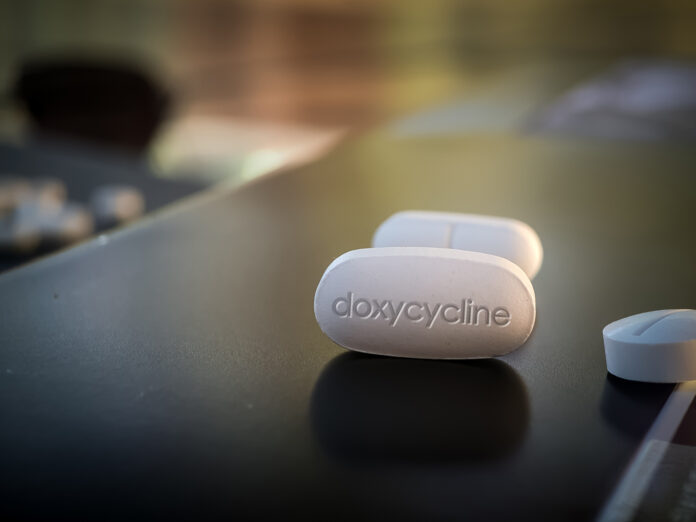Recent studies indicate that a single dose of an antibiotic can decrease risk of contracting some common sexually transmitted diseases (STDs) after potential exposure. According to the studies, doxycycline used as post-exposure prophylaxis can help protect men who have sex with men (MSM) and trans women from these potential infections. Dr. Lenore Asbel, a medical specialist in infectious diseases in the Philadelphia Department of Public Health, has been prescribing the antibiotic doxy-PEP, as it’s commonly called, to all of her PrEP patients, most of whom are MSM.
The study Doxy-PEP to Prevent Bacterial STIs in Men who Have Sex with Men and Transgender Persons who have Sex with Men from the Public Health department of Seattle & King County showed that MSM and transgender women who used doxy-PEP as part of a trial experienced 65 percent lower rates of contracting syphilis, chlamydia and gonorrhea. The study showed that 50 percent of prevented STDs were gonorrhea, 43 percent were chlamydia and 7 percent were syphilis. Participants took an average of roughly four doses of doxy-PEP a month.
“We don’t have the same usage that they did in that study that was done out of Seattle & King County,” Asbel said. “People tended to use it more frequently. We’ve been recording it; there’s pretty good acceptability, everybody is interested in taking it, [they] take the bottle home.”
Prescriptions for doxy-PEP indicate that two pills should be taken 24-72 hours after a known exposure, with food. Though some may experience mild nausea after taking the drug, doxycycline is fairly well tolerated, Asbel said.
“It should not eliminate your testing,” she clarified. “I always like to think of it as the ‘Plan B’ for STD prevention. It’s not for when you know somebody has gonorrhea, chlamydia or syphilis, and you’re taking it to prevent it. Then you should come in, get tested and get the actual course of antibiotics for exposure. This is if you have a high risk exposure, maybe with somebody you don’t know as well, and you are not sure if they have something.”
Studies focusing on cisgender women have shown that doxy-PEP has not been as effective, Asbel explained.
“It’s not clear whether that’s biology or like when they studied PrEP in certain populations — because people didn’t see themselves at risk, they didn’t actually use it in the same way,” she said. “It’s not clear why it was not as effective in that population.”
PGN previously reported that Philadelphia health data indicates an all-time high rate of new syphilis infections in the last decade. Fortunately, any health care provider can prescribe doxy-PEP, Asbel said. Physicians at Mazzoni Center prescribe doxy-PEP on a regular basis for interested patients, said David Weisberg, executive development and communications officer at Mazzoni.
“It is highly effective for prevention of chlamydia and syphilis, and it is of particular relevance in a time when our default syphilis treatment is back ordered and more difficult to locate,” Weisberg said in an email.
Nackea Bachman, physician assistant at Bebashi Transition to Hope, prescribes doxy-PEP to MSM and trans women patients who experience recurring STDs.
“This patient population is disproportionately affected by STDs for multiple reasons, including lack of access to quality, non-discriminatory sexual healthcare,” Bachman said in an email. “Offering doxy-PEP not only reduces individual STD risk, but it is also an important public health measure to reduce increasing national rates of STDs.”
Asbel pointed out that one concern with doxy-PEP is that gonorrhea is a “sneaky organism” that tends to develop resistance to medications over time. Gonorrhea rates likely varied in different populations that underwent studies depending on local resistance patterns.
“In the study that was done in Seattle, there tended to be less doxycycline resistance than there was in the original study that was done in France,” Asbel said. “That was one of the reasons they saw decreased rates in gonorrhea. So we may not see those same effects in a few years, but that’s true for a lot of the medications we routinely used in the past for gonorrhea.”
Asbel underscored the fact that not only does doxy-PEP prevent STDs, it lowers the risk of spreading the STD to someone else.
“If you’re able to take this as post-exposure prophylaxis and not become infected, you’re less likely to pass it on to somebody. That’s one of the reasons that we hope people use [doxy-PEP]. It’s something that people can do for themselves without having to call and get in or wait for an appointment.”

